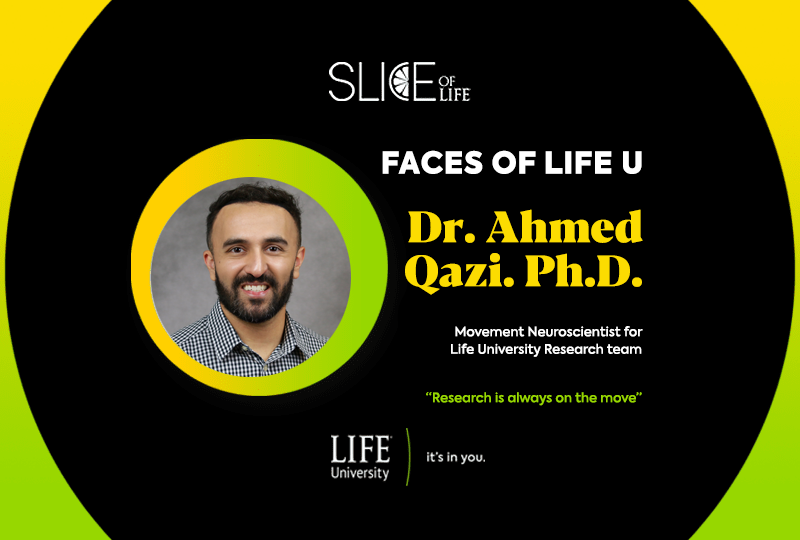Movement Neuroscientist for Life University Research team
“Research is always on the move”
As an undergraduate at the University of Georgia (UGA), Dr. Ahmed Qazi had a particular interest in becoming a hands-on health practitioner as a clinician in physical therapy and rehabilitation. After graduation at UGA, he did work in those fields for a while and ultimately felt it wasn’t what he wanted for himself. Instead of continuing on in physical therapy or rehabilitation, he instead went on to complete his master’s. That became his first deep introduction into the world of research, learning how to construct a research study from the ground up and turn it into a thesis. He delved even further into the world of academia by pursuing his Ph.D., and while working toward that credential at UGA, he become acquainted with Dr. Stephanie Sullivan.
Dr. Stephanie Sullivan is the Director of the Dr. Sid E. Williams Center for Chiropractic Research (CCR) here at Life University (Life U), as well as Associate Vice President of Research for the Complementary Healthcare Advanced Research and Leadership Institute (CHARLI). At the time that she and Dr. Qazi met, UGA and Life U were collaborating on a research project, a common occurrence that demonstrates the commitment Life U has to cultivating and sharing knowledge with other research-oriented institutions. Through working with Dr. Sullivan, other staff and students with the dedicated Life U Research department, Dr. Qazi began to get a solid picture of the research environment thriving at Life U. Shortly after completion of his Ph.D., Dr. Qazi accepted a position at the research lab at Life U. His background and main focus of his research is kinesiology, “the study of the art of movement.”
“As a movement neuroscientist, my job is to understand the mechanisms behind how chiropractic interventions can impact and improve the quality of our movement. So, it’s not so much that we can move from point A to point B, but it’s that what is the quality of that movement that gets us from point A to point B,” Dr. Qazi said.
“My background in psychology as well kind of allows me to really understand the interplay between the nervous system and then how that impacts several different movement outcomes as a result of different types of interventions.”
Dr. Qazi’s research, along with other vital members of the Life U Research team’s research, is fascinating and could have many helpful applications in the future.
“A lot of our research is centered around the interplay between the autonomic nervous system, movements, neuropsychology, the brain – all these different mechanisms that come together to allow us to really have a very elevated quality of life.”
When Dr. Qazi first started at Life U, he was able to continue work on the aforementioned project collaboration with UGA, a “feasibility study that looked at the development of a neuropsychological test battery.” The idea was to develop a collection of assessment designed to pinpoint how specific brain areas were functioning.
“We took this test and added it to a movement paradigm. Ambulating, walking on a treadmill while performing a pretty intense cognitive task. How does that impact how we move? That is a feasibility study that was completed a short time ago, and now we’re applying that same design to an actual research study that we’re doing currently in our lab, looking at individuals with obesity,” Dr. Qazi said.
Dr. Qazi is excited to see how the “cool data that’s coming out is reaffirming” what was previously noticed in the initial feasibility study. The hope is that this latest study will be completed soon and the results disseminated in the coming months. Dr. Qazi is fortunate to work on research that excites him and has real-world implications that hopefully can be utilized in the not-so-distant future
When asked what advice he would give to students interested in research as a career, Dr. Qazi responded that there is a point early on where a student might shadow a researcher and the grind of the data collection and day-to-day work might seem boring or less than fulfilling. Yet, once these students see the real-world applications and importance of this research, the mindset completely changes. His advice is to find an area of research that truly compels you and pursue that.
Dr. Qazi is excited for the continued growth and development of research at Life U. In particular, the implementation of CHARLI should allow for more efficient dissemination and collaboration on emerging research. To learn more about CHARLI, please visit CHARLI.life.edu.


Social Media